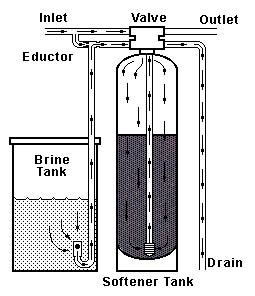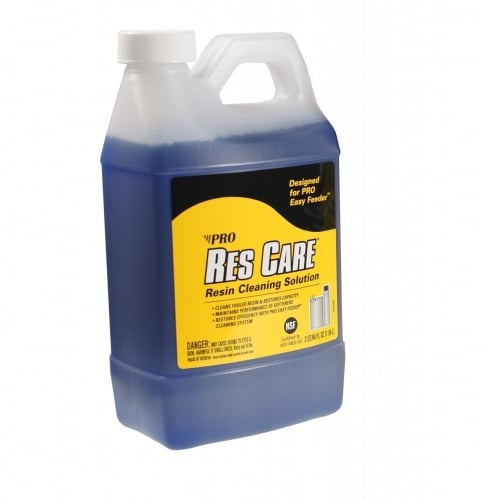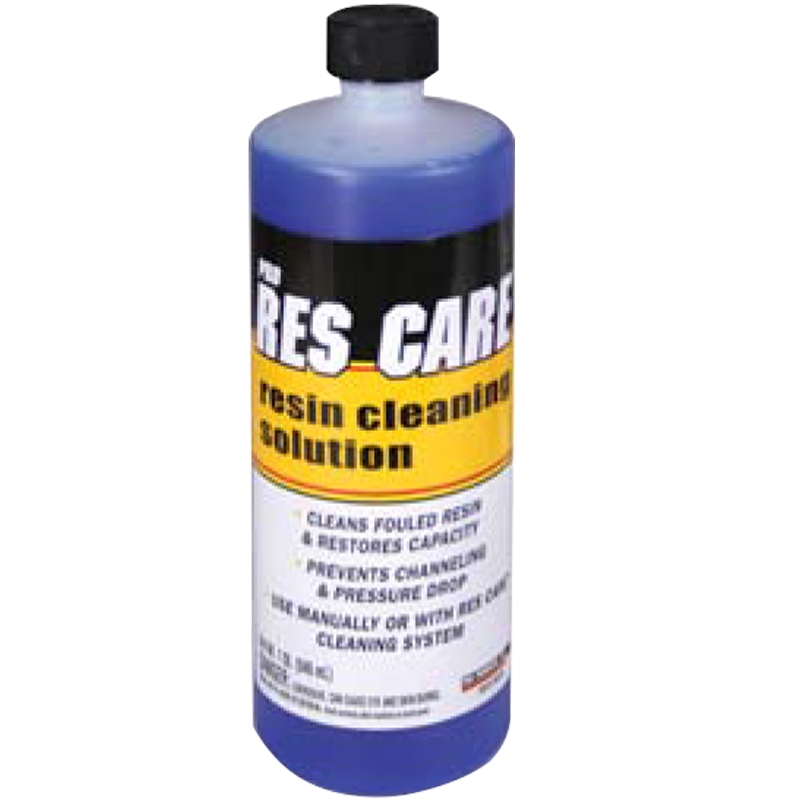Resin bed cleaner is a specialized solution for removing mineral deposits from water softener resin beads. It prevents clogs and maintains optimal performance.
Using a resin bed cleaner is essential to ensure the effectiveness and longevity of your water softening system. Regular cleaning helps prevent mineral buildup, which can lead to decreased efficiency and potential system malfunctions. Proper use involves mixing the cleaner with water, pouring it into the brine well, and activating the regeneration mode promptly.
It is important not to mix the resin bed cleaner with salt in the tank. Resin bed cleaners are widely available at hardware stores and home centers, offering an easy and effective solution for maintaining your water softener system.

Credit: resinrescue.com
The Role Of A Resin Bed In Water Softening
When it comes to water softening, the role of a resin bed is crucial in the process. The resin bed is a key component of a water softener, responsible for removing hardness-causing minerals from the water supply. Understanding the function of resin beads and the process of softening water can provide valuable insights into the effectiveness of water softening systems.
Function Of Resin Beads
Resin beads are the heart of a water softener, playing a vital role in the softening process. These tiny beads are made from a porous polymer substance, designed to attract and trap calcium, magnesium, and other hard minerals present in the water.
As water flows through the resin bed, the hardness-causing minerals adhere to the resin beads, allowing the water that emerges from the softener to be free from these unwanted contaminants. Over time, the resin beads can become fouled with mineral deposits, necessitating the use of a resin bed cleaner to maintain optimal performance.
Process Of Softening Water
The process of softening water involves a series of steps that take place within the water softener unit. When hard water enters the softener, it flows through the resin bed where the ion exchange occurs. The hardness minerals in the water are exchanged for sodium ions, effectively softening the water.
Once the resin bed becomes saturated with hardness minerals, the regeneration process is initiated. During regeneration, a brine solution is used to flush out the accumulated minerals from the resin beads, preparing them for another cycle of softening the incoming water. Regular use of resin bed cleaner helps to prevent mineral buildup and maintain the efficiency of the water softener system.
Significance Of Resin Bed Cleaners
Resin bed cleaners play a crucial role in maintaining the efficiency of water softening systems. Regular use of these cleaners is essential for preventing issues that can arise from mineral buildup within the resin bed.
Preventing Buildup And Clogs
Resin bed cleaners are designed to break down and remove mineral deposits from the resin beads, preventing the buildup that can lead to clogs and reduced system performance.
Maintaining System Efficiency
By regularly cleaning the resin bed with specialized cleaners, you can ensure that your water softening system operates at peak efficiency, providing you with quality soft water consistently.
Common Contaminants In Resin Beds
Resin bed cleaners are essential for breaking down mineral deposits in water softening systems. Regular use prevents clogs and maintains optimal performance by removing buildup from resin beads. Proper usage involves mixing with water, pouring into the brine well, and avoiding contact with the salt tank.
Common Contaminants in Resin Beds Resin bed cleaners are essential for maintaining the efficiency of water softening systems. Resin beds can become contaminated with various substances, including iron, manganese, and other foulants. These contaminants can reduce the effectiveness of the resin bed and lead to clogs and reduced performance. Iron and Mineral Deposits Iron is a common contaminant in resin beds, especially in areas with high iron content in the water. Iron can cause staining and discoloration of fixtures and appliances, as well as foul odors and tastes. Resin bed cleaners that target iron and mineral deposits can break down and remove these substances, restoring the effectiveness of the resin bed. Manganese and Other Foulants Manganese is another common contaminant that can accumulate in resin beds. Manganese can cause staining, discoloration, and foul odors in water, as well as reducing the effectiveness of the resin bed. Other foulants, such as organic matter and bacteria, can also accumulate in resin beds and cause similar issues. Resin bed cleaners that target manganese and other foulants can effectively remove these contaminants and restore the efficiency of the resin bed. In conclusion, regular use of resin bed cleaners is crucial for maintaining the effectiveness of water softening systems and preventing the buildup of contaminants that can reduce performance and cause issues with water quality. By targeting common contaminants such as iron and manganese, resin bed cleaners can effectively restore the efficiency of resin beds and improve the overall performance of water softening systems.
Credit: www.cleanwaterstore.com
Choosing The Right Resin Bed Cleaner
When it comes to maintaining your water softener system, selecting the right resin bed cleaner is crucial. The resin bed in your water softener is responsible for removing impurities and hardness from your water supply. Over time, the resin bed can become fouled with contaminants such as iron, sediment, or organic matter, leading to reduced efficiency. Therefore, choosing the appropriate resin bed cleaner is essential to ensure the longevity and optimal performance of your water softener.
Types Of Cleaners Available
There are different types of resin bed cleaners available in the market, each designed to target specific contaminants. These cleaners can be broadly categorized into:
- Iron removing cleaners
- Organic matter cleaners
- General purpose resin cleaners
Selecting For Specific Contaminants
When selecting a resin bed cleaner, it is important to consider the specific contaminants present in your water supply. Different cleaners are formulated to address particular types of fouling. For instance, if your water softener is affected by iron buildup, opting for an iron removing cleaner would be the most effective choice. Similarly, if organic matter is the primary concern, selecting a cleaner designed to tackle organic contaminants would yield the best results.
Application Of Resin Bed Cleaners
Resin bed cleaners are essential for maintaining the optimal performance of water softeners. Proper application of resin bed cleaners ensures the longevity and efficiency of the resin bed, preventing mineral buildup and clogs. Understanding the correct techniques and timing for applying resin bed cleaners is crucial for the overall effectiveness of water softening systems.
Mixing And Pouring Techniques
When using a resin bed cleaner, it is vital to mix it with water and pour it into the brine well of the water softener. Avoid pouring the resin bed cleaner into the salt tank, as this can affect the softening process. Once the cleaner is poured into the brine well, initiate the softener into a regeneration mode immediately for thorough cleaning.
Timing And Frequency Of Cleaning
The timing and frequency of resin bed cleaning play a significant role in maintaining the water softener’s efficiency. It’s recommended to perform resin bed cleaning on a regular basis, typically every few months, to prevent mineral deposits from accumulating and impacting the system’s performance. Additionally, if the water source has high iron content, more frequent cleaning may be necessary to mitigate staining and fouling.
Resin Bed Cleaner Vs. Traditional Salt
Resin Bed Cleaner is a specialized solution that effectively breaks down mineral deposits in water softener resin beads. Unlike traditional salt, Resin Bed Cleaner prevents clogs and maintains optimal water softening performance over time.
Introduction: Water softening systems use resin beads to remove minerals from hard water. Over time, these resin beads can become coated with mineral deposits, reducing their efficiency and causing issues with the softening system. This is where resin bed cleaners come in. But how do they compare to traditional salt? Let’s take a look. H3: Limitations of Salt Alone While salt is a necessary component of a water softening system, it does have its limitations. Salt is only effective at removing minerals from the water, but it cannot remove the buildup of minerals on the resin beads themselves. This buildup can lead to reduced efficiency and ultimately the need for costly repairs. Additionally, salt alone cannot remove other contaminants that may be present in the water. H3: Benefits of Additional Cleaning Agents This is where resin bed cleaners come in. Resin bed cleaners are specifically designed to break down and remove mineral buildup from the resin beads, restoring their efficiency and prolonging the life of the softening system. In addition, many resin bed cleaners also contain other cleaning agents that can remove other contaminants from the water, improving its overall quality. Regular use of a resin bed cleaner can prevent clogs, reduce the need for repairs, and ensure that your water softening system is working at peak efficiency. Conclusion: In conclusion, while salt is an important component of a water softening system, it does have its limitations. Resin bed cleaners are a valuable addition to any softening system, helping to prevent mineral buildup and improve water quality. Regular use of a resin bed cleaner can prolong the life of your softening system and save you money in the long run.Diy Vs. Professional Cleaning Products
When it comes to cleaning your water softener resin bed, you have two main options: DIY solutions or professional cleaning products. Each method has its pros and cons, so it’s essential to understand the differences before making a choice.
Homemade Solutions
If you prefer a more hands-on approach, you can opt for DIY resin bed cleaners using common household ingredients. These homemade solutions are cost-effective and eco-friendly, making them a popular choice for those who enjoy DIY projects.
Commercially Available Options
Professional cleaning products are specially formulated to effectively clean and maintain resin beds in water softeners. These products are convenient and often offer superior results compared to DIY solutions, but they may come at a higher cost.
Best Practices For Resin Bed Maintenance
Ensuring the proper maintenance of the resin bed in your water softener system is crucial for its optimal performance and longevity. By adhering to best practices for resin bed maintenance, you can prevent common issues and extend the lifespan of your water softener. Here are some essential guidelines for maintaining your resin bed:
Regular Cleaning Schedules
Regular cleaning is vital to prevent mineral buildup and maintain the efficiency of the resin bed. Implementing a consistent cleaning schedule will help to ensure that your water softener operates at its best. It is recommended to clean the resin bed at least once every six to twelve months, depending on the water hardness and usage.
Troubleshooting Common Issues
Identifying and addressing common issues with the resin bed is essential for its proper functioning. Some common problems include reduced water softening capacity, resin bed fouling, and iron buildup. Regular monitoring and testing can help in early detection of these issues, allowing for timely intervention to prevent any significant damage to the resin bed.
User Experiences With Resin Bed Cleaners
Resin bed cleaners are essential for maintaining the effectiveness of water softening systems, ensuring that resin beads remain free from mineral deposits and continue to produce soft water. Users have shared their experiences with resin bed cleaners, providing valuable insights into their effectiveness and benefits.
Reviews And Recommendations
Many users have attested to the efficacy of resin bed cleaners in preventing mineral buildup and maintaining the performance of their water softeners. They have noted that regular use of these cleaners has helped to prevent clogs and ensure consistent water softening. Additionally, users have recommended specific brands and formulations based on their positive experiences, guiding others towards effective products for resin bed maintenance.
Case Studies And Success Stories
Several users have shared success stories after using resin bed cleaners to address issues such as red staining in sinks caused by high iron content in water. These case studies highlight the effectiveness of resin bed cleaners in restoring fouled resin beds and eliminating mineral deposits, ultimately improving the quality of softened water. Such success stories serve as valuable testimonials for the efficacy of resin bed cleaners in real-world scenarios.

Credit: www.amazon.com
Environmental And Safety Considerations
Resin bed cleaner is a specialized solution that effectively eliminates mineral deposits from resin beads in water softening systems. Regular use prevents clogs and maintains optimal performance, ensuring a continuous supply of soft water for your household. Use with caution by following proper mixing and application instructions for best results.
Eco-friendly Cleaning Solutions
Resin bed cleaners offer eco-friendly solutions that break down mineral deposits without harming the environment. Look for cleaners labeled as biodegradable and safe for septic systems.Handling And Disposal
When handling resin bed cleaners, wear gloves and protective eyewear to prevent skin and eye irritation. Always follow the manufacturer’s instructions for proper handling and disposal. Dispose of empty containers responsibly according to local regulations. Avoid pouring resin bed cleaner directly into water sources or storm drains. Instead, dilute the cleaner with water before disposal. Store cleaners in a cool, dry place away from children and pets. In case of accidental ingestion or exposure, seek medical attention immediately. Keep the product label or Safety Data Sheet handy for reference. Proper handling ensures safety for you and the environment. Remember, a clean resin bed leads to optimal water softener performance. Choose environmentally friendly cleaners and follow safety protocols for a hassle-free cleaning experience.Frequently Asked Questions
What Does Resin Cleaner Do?
Resin cleaner breaks down mineral deposits from water softener resin beads, preventing clogs and maintaining performance. When using a resin bed cleaner, mix with water, pour into the brine well, and put the softener in regeneration mode immediately. Regular cleaning ensures efficient water softening.
Resin bed cleaners are readily available at hardware stores.
How To Use Resin Bed Cleaner?
To use resin bed cleaner, mix it with water, pour it into the brine well, and put the softener in regeneration mode immediately. Avoid pouring the cleaner in the salt tank. Regular use prevents mineral buildup and maintains performance. Resin bed cleaners are available at hardware stores.
What Does A Resin Bed Do?
A resin bed in a water softener system contains resin beads that remove mineral deposits from water, ensuring soft water.
What Is The Best Resin Cleaner?
The best resin cleaner is one that is specifically designed to break down and remove mineral deposits from the resin beads in your water softening system. Regular use of a cleaner prevents buildup that can lead to clogs and reduced performance.
Some popular options include Res Care Liquid Water Softener Cleaner, ReSTore Resin Treatment & Cleaner, and Res Care Resin Cleaner. It’s important to follow the manufacturer’s instructions when using a resin cleaner.
What Is Resin Bed Cleaner?
Resin bed cleaner is designed to break down and remove mineral deposits from the resin beads in your water softening system.
Conclusion
Using a resin bed cleaner is crucial for maintaining optimal water softener performance. Regular cleaning prevents mineral buildup and clogs, ensuring a continuous flow of soft water. Remember to follow instructions carefully for best results and enjoy clean, refreshing water every day.

